Putin's media takeover
The Russian government does not only keep a close watch on television channels, radio broadcasters and printing press, it also tries to control the internet. This makes it even more difficult for Russians to obtain information that has not been screened by the Kremlin.
The following examples illustrate the consequences of this tight control. On July 12th 2014, a television station belonging to the Russian state, Channel One, broadcasted a chilling story about a 3-year-old boy crucified by soldiers of the Ukrainian army in the city Slavyansk.
Journalists of the independent TVRain and NovayaGazeta, proved the story to be false. Only in December 2014 the channel finally admitted the lie, after president Vladimir Putin had talked about the “event” at his annual press conference.
Only six months later Channel One admitted the lie, after Putin had talked about the “event” at his annual press conference.
At the beginning of March 2015, NTV channel covered the murder of the Russian opposition member Boris Nemtsov. The television station gave a set of plausible facts and different versions of stories surrounding the death of the politician. They referred to (the actions of) the opposition with statements as “propaganda of an anti-crisis march” and “sacral victim”. That way they tried to convince the audience of their point of view.
At the same time, NTV did not mention the train service in several Russian regions being cut or the financial impact of the Western sanctions on the Russian economy. They didn’t criticize the government in any way.
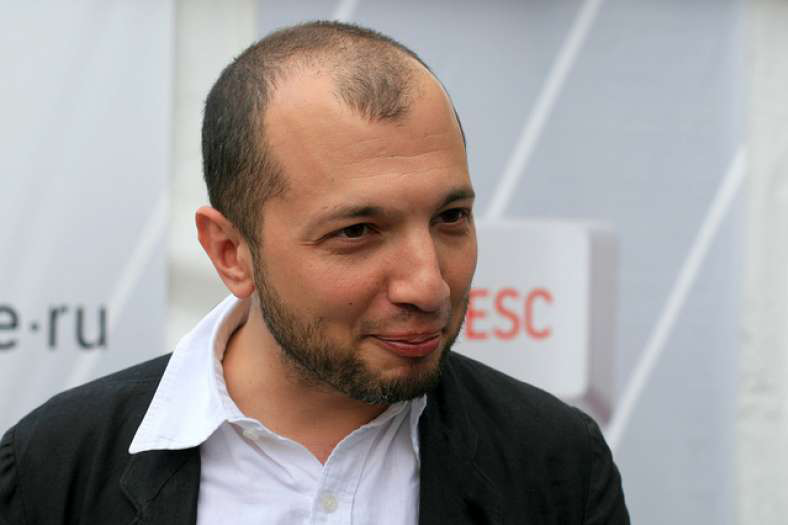
Goodbye, foreign investors
In April 2015, one third of Vedomosti, a Russian business newspaper, was sold to Demyan Kudryavtsev. He is the former director of the publishing company Kommersant. The other shares are owned by FT Group and Dow Jones, for now. They will also be sold, due to a new law concerning foreign investments in Russian media.
An international agent is not allowed to own more than twenty percent of a Russian media enterprise.
According to this law, an international agent is not allowed to own more than twenty percent of a Russian media enterprise. This includes television, printing press and radio. The law was signed in October 2014 and will come into force in January 2016. Before this date, only the foreign television shareholding is limited up to 50 percent.
This process should be considered in the overall trend of Russian media development. Undesired opinions are being eliminated, which makes it harder for citizens to receive all the information they want.
Putin’s masterpiece
To what extent is Putin responsible for the current media landscape? According to Alexey Venediktov, chief editor of Echo.Moskvy, it is ‘Putin’s masterpiece’.
The vague status of freedom that the media knew after the collapse of the Soviet Union could not be maintained for long. During the period 1992 to 1999 the media commercialized. TV stations, radio channels, newspapers and business journals were quickly bought and consolidated in the hands of major oligarchs.
By 1999 the picture of the media market was pretty much set in stone: Boris Berezovsky and Vladimir Gusinsky emerged as the new Russian media moguls, controlling the majority of print media and the most powerful TV channels.
The state eliminates undesired opinions.
Putin, who came to power in 2000, and his desire to control public opinion shaped the Russian media further. In order to tighten media control, Putin took some rigorous measures as president. In 2001 Media-Most, the media assets of the oligarch Vladimir Gusinsky, became part of the Gazprom-group, which is partly in hands of the Russian state. At that time Media-Most consisted of more than sixteen media enterprises, including a publishing house, television station and radio channels.
Consequently the state gained control over the main Russian TV channel ORT. In 2006 publishing company Kommersant also came under government control, after being taken from Berezovsky. It was bought by Alisher Usmanov, a steel tycoon who works closely with the state.
Because of these developments, the media landscape changed deeply between 1999 and 2014. Currently the share of state-owned media enterprises has increased, commercial media is controlled by oligarchs loyal to the Kremlin and only a bundle of insignificant media is still standing, to please a small group of progressive intellectuals.
TV junkies
Because of Putin’s ‘masterpiece’ it is hardly possible for journalists to publish an alternative view. The audience does not demand such a view either, according to a report published by the Levada center in June 2014. The independent research center analyzed the preferences of Russians in terms of media consumption. Surprisingly, more than half of the respondents stated that they are satisfied with having only one source of information.
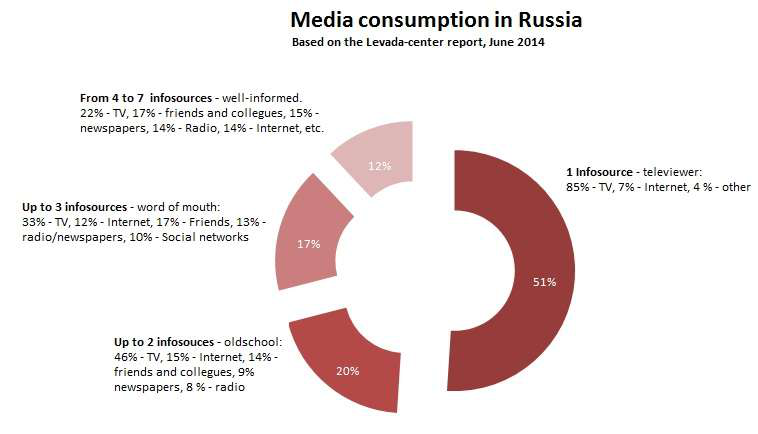
90 percent of the respondents use television as their main source of information, independently of gender, age or profession. Most people in this group watch the federal channels. Especially Channel One, Russia-1 and NTV are popular. Independent television channels, like Euronews, REN TV and Dozhd, are being watched by 17 percent of the respondents.
Every Russian has access to three state channels. Consequently these channels are popular. For example, the federal coverage of Channel One is more than 98,8% of Russian territory. More than 20 million Russians watch Channel One every week.
In order to watch the independent channel Dozhd on the other hand, citizens need to subscribe online or pay in advance. People with a low income, or people without internet access can’t subscribe. Still, its weekly audience reached 3.5 million people in 2013. After that year most of the Russian television providers ended up banning the channel.
The fact that many people use television as a source of information does not imply that they are not skeptical towards information received. According to the report of the independent Levada center, fifty percent has doubts about the authenticity of news stories. The amount of sceptics is growing as well. However, this skepticism disappears when more channels repeat the same story.
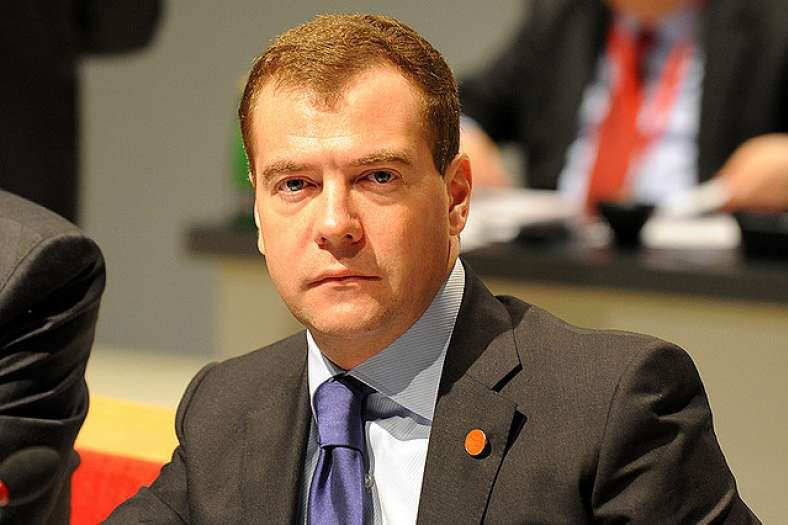
New media, new rules
The last couple of years, citizens go online more often in order to find information. This way of communicating has already shown its potential to bring organized crowds of people together in 2011 and 2012 when Dmitry Medvedev was still president. Protests and discussions are dangerous for the Kremlin. That’s why the government wants to retain some form of control over the internet.
In their first move, the Russian state introduced a law that should prevent children from seeing undesired content (e.g. suicide, extremism and child pornography) on websites. In July 2012 the government voted on some amendments, giving Putin the power to block harmful websites without a notification or the approval of a judge. This practice is not in line with the United Nations (UN) resolution on ‘the promotion, protection and enjoyment of human rights on the Internet’.
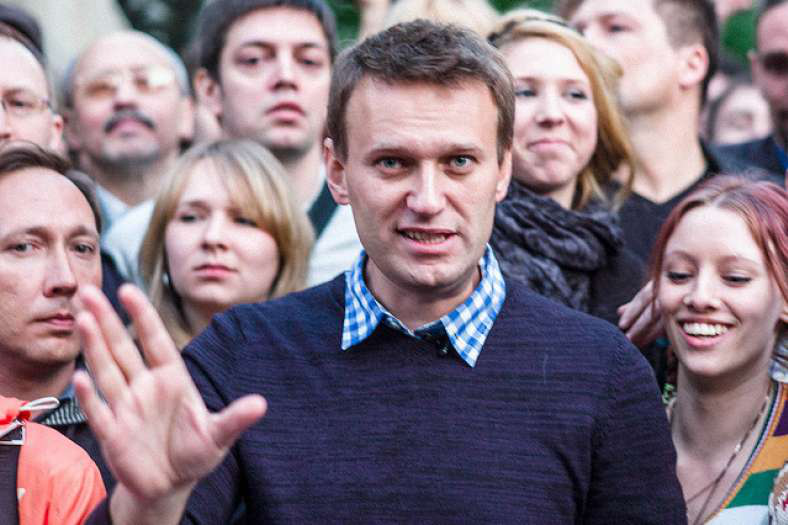
In the following years, the government kept an eye on the internet. The law on site blockage was extended and the register of forbidden sites grew longer. Mass demonstrations to stop these developments have been ignored. Amongst these ‘harmful’ websites that have been blocked are some critical news websites and blogs of opposing politicians. For example, Alexey Navalny’s blog has been shut down due to alleged ‘extremism’.
In 2014 this continued, but attention wane as the coverage of the Olympic Games in Sochi and the the situation in the Ukraine unfolded. The same year the chief editor of Lenta.ru, Galina Timchenko, was fired without being given any explanation. The majority of her colleagues quit as well and wrote an open letter of complaint. Currently Timchenko runs a website from Latvia, where the Russian rules do not apply.
Trolls are born
At the same time, the government approved a law, which is known as ‘the law on bloggers’. It applies to people with a personal website who have more than three thousand visitors. The owners of these websites are obliged to register their sites at the state register. Consequently, the bloggers have duties. However, they are not granted any rights.
The influence of the state on the internet has increased.
Aside from blogs, the government keeps a close watch on social network sites. Pavel Durov, founder of the Russian social network Vkontakte.ru, was forced to leave his job after Mail.ru Group bought his network. According to Durov, he was fired because he did not accept ‘the pressure of the new shareholders’. In the meantime he emigrated.
Because of this policy, the influence of the state on the internet has increased. For instance, four of the top ten Russian websites are currently controlled by the Kremlin.
Putin is expanding his ‘masterpiece’ by attempting to rule the internet. Nevertheless, the government also ensures that discussions on social network sites, blogs and forums are possible – if they have the right tone that is. In order to achieve a positive image of the state, the government has introduced ‘trolls’ or people who write positive commentaries on the government and its policies in exchange for money, effectively polluting the online debate. One wonders what might be next.
Maak MO* mee mogelijk.
Word proMO* net als 2790 andere lezers en maak MO* mee mogelijk. Zo blijven al onze verhalen gratis online beschikbaar voor iédereen.
Meer verhalen
-
Report
-
Report
-
Report
-
Interview
-
Analysis
-
Report


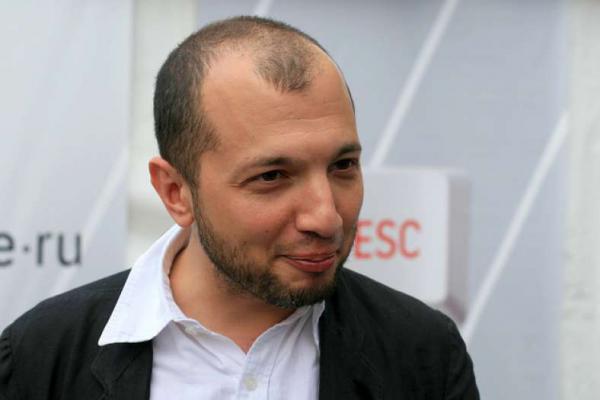
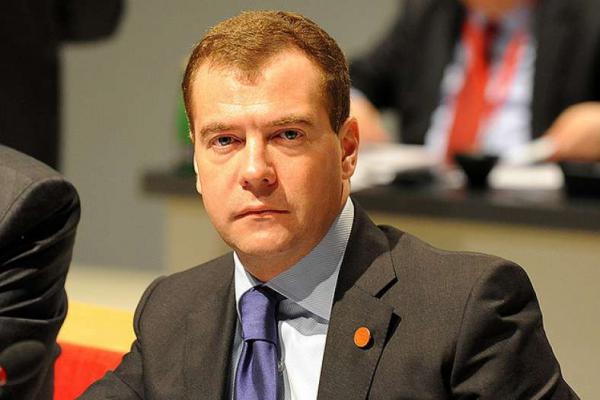
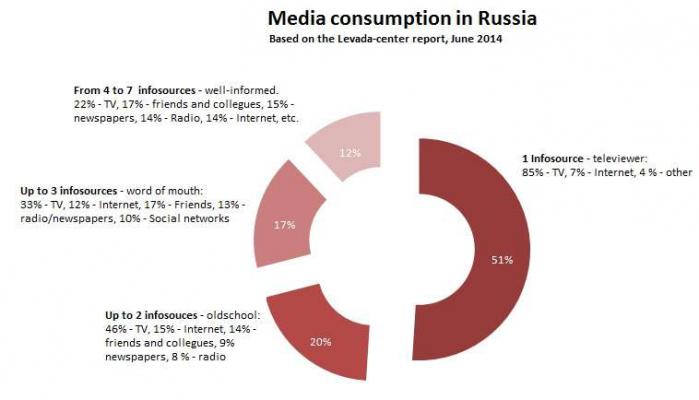









 Oxfam België
Oxfam België Handicap International
Handicap International